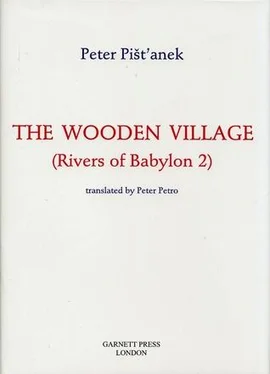Peter Pišťanek - The Wooden Village
Здесь есть возможность читать онлайн «Peter Pišťanek - The Wooden Village» весь текст электронной книги совершенно бесплатно (целиком полную версию без сокращений). В некоторых случаях можно слушать аудио, скачать через торрент в формате fb2 и присутствует краткое содержание. Год выпуска: 2008, Издательство: Garnett Press, Жанр: Современная проза, на английском языке. Описание произведения, (предисловие) а так же отзывы посетителей доступны на портале библиотеки ЛибКат.
- Название:The Wooden Village
- Автор:
- Издательство:Garnett Press
- Жанр:
- Год:2008
- ISBN:нет данных
- Рейтинг книги:3 / 5. Голосов: 1
-
Избранное:Добавить в избранное
- Отзывы:
-
Ваша оценка:
- 60
- 1
- 2
- 3
- 4
- 5
The Wooden Village: краткое содержание, описание и аннотация
Предлагаем к чтению аннотацию, описание, краткое содержание или предисловие (зависит от того, что написал сам автор книги «The Wooden Village»). Если вы не нашли необходимую информацию о книге — напишите в комментариях, мы постараемся отыскать её.
The Wooden Village — читать онлайн бесплатно полную книгу (весь текст) целиком
Ниже представлен текст книги, разбитый по страницам. Система сохранения места последней прочитанной страницы, позволяет с удобством читать онлайн бесплатно книгу «The Wooden Village», без необходимости каждый раз заново искать на чём Вы остановились. Поставьте закладку, и сможете в любой момент перейти на страницу, на которой закончили чтение.
Интервал:
Закладка:
When he was about seven, a problem cropped up: he began stealing toys from the children in the brickyard area. Freddy’s father found it suspicious that little Freddy spent so much time in a tool shed on the building site of their house. A thorough search of the tool shed revealed a hiding place where Freddy concealed all the stolen toys and where he played with them. In the evening, Mešťánek and Freddy did the rounds of the brickyard barracks, and in each flat where there were children a blushing Freddy had to return a toy and apologize, using words that his father forced him to learn. All the families, except for Freddy’s father, took a humorous view of the matter. But when they got home, Freddy was thrashed by his hysterical mother, who had just got back from work and found out about everything.
He always had technical inclinations. Once, he assembled a bicycle. One that worked.
Old Mešťánek reminisces as he smokes. It was those blasted tarts from the brickyard that ruined Freddy. Those forward, precocious young girls who ran around all day dressed in tee-shirts and shorts, always giggling at various immoral things that they learned from the adults. Their parents knocked back the drink in the factory buffet and the girls had no other entertainment but to ruin normal little boys like Freddy. Mešťánek’s son fell victim to those monsters. It certainly wasn’t quite like what old Forgách said. And anyway: who knows what old Forgách saw? Those blasted tarts from the brickyard must have seduced Freddy, if he masturbated in front of them, if he had masturbated at all!
Afterwards, when Freddy was a student at Hodonín, he behaved quite normally. True, of course, Freddy’s father saw him only at weekends, but then Freddy behaved quite normally. Indeed, he was even more normal than his classmates: no beer, no cigarettes, no discos, and no girls. He preferred roaming the woods round Nová Ves, alone, or in a group. Every now and again younger friends would come to see him. They would play nice games: cowboys and Indians, and so on. It’s odd that Freddy had no girl-friend; not at home in Nová Ves, nor in Hodonín. But that was OK, too. Freddy was in no hurry.
What his parents missed were his explosions of happiness when he got his gifts: his right shoe on his birthday and his left shoe for his name day a few weeks later. Or when he got the wool for a pullover at Christmas and the knitted pullover for his birthday. Freddy seemed uncommunicative and didn’t talk much any more. Most of the time he spent outside, with his younger friends.
But let’s face it, what could he do at home? His attic room was furnished like a room in the worker’s dormitory: a bed, table, chair, a chest for bedding, wardrobe, carpet, and a dusty palm grown from a date seed which (together with another two dates) Freddy got for Christmas. The only thing you could do there was lie on the bed and stare at the ceiling for hours, your hands under your head, or do your homework.
For his secondary school matriculation evening Freddy’s father lent him his wedding suit. It was a bit tight on Freddy, but otherwise it was fine, so his unhappy parents never understood why Freddy refused to go to the party and preferred to stay sulking in bed under his eiderdown.
Even after secondary school, when Freddy worked in the brickyard as a shift foreman, nobody saw him with any girl. He wasn’t conscripted into the army, since a vein in his brain had ruptured when he was a child. Nothing serious, at least he could stay at home. He wouldn’t have liked the army anyway; he liked his comforts.
Old Mešťánek would have never thought that his only son was a pervert. They always got along well. But ever since Freddy became a businessman and started to work at the car park, his father could never find a way of communicating with him. Perhaps, this was because Freddy rarely came home; he mostly slept in his trailer at the car park. His uncomfortable bachelor room was left empty most of the week. One day his mother was cleaning up and unwittingly opened the bedding chest. She discovered such terrible magazines at the bottom of the chest that she started to scream like a woman demented, until old Mešťánek ran in. Horrified, they both browsed through these well-thumbed colourful picture magazines with horrifying covers, names, and even more terrible contents and tried to tell each other that what they were seeing couldn’t be true. The magazines specialized in one or other narrow field of unusual sex, so unusual that Freddy’s parents, who had a simple education, couldn’t even understand what was going on when they looked at some photographs. The sight of some pages in one of the magazines, depicting a live schoolgirl being quartered, forced old Mrs Mešťánek to go outside and vomit. Freddy’s father was tougher; he packed up the magazines, took them behind the house and ritually burned them in the garden incinerator. He looked at the fire and used a long poker to ensure that all the pages were burned, watching the hungry flames consume the squashed or tumescent female, male, children’s, or animal genitals and turn them into grey ashes. He was wondering what to say to Freddy when his son came home, but could not think of anything.
Usually, Freddy didn’t come home for days on end, and when he finally came, nobody said a thing to him. His parents were silent about burning his magazines, and he asked no questions when he opened the chest and found his expensive magazines gone. Everything carried on as if by silent mutual agreement.
“He should find a girl; that would calm him down,” his mother used to say. After all, he was thirty-five now, she would add. And old Mešťánek nodded in agreement. “For a catch like our Freddy,” his mother went on, “an only son with a family house and a large garden, girls would do anything.”
But Freddy didn’t even want to hear the word marriage. He worked hard, day and night. When he came home, he only wanted to eat and sleep and didn’t want to hear any talk of marriage. He was always in a bad mood. He realised that the perverted magazines, for which he’d paid an extortionate amount while still working at the car park, had been discovered and removed by his parents. However, he had no idea what to do about it, and so he did nothing.
Several times now, old Mešťánek has climbed the stairs to see him. He knocks at the door of Freddy’s room, enters and sits down, his eyes open wide and full of paternal understanding, asking his son if he had any problems. “No, thanks, there’s no problem,” Freddy would always respond. “Do you need any help with anything?” his father would ask. “No thanks, I don’t need any help,” Freddy would say. “If you have a problem, tell me about it,” said his father. “We can find a solution together,” he added. “Thanks, I don’t have any problems,” Freddy said politely, but firmly. Old Mešťánek felt as if his son was throwing him out. He sighed, rose reluctantly to his feet, and went towards the door. “But still, if there is anything…” he said with his hand on the handle. “Thanks, everything’s okay,” Freddy would answer, and old Mešťánek would leave the uncomfortable room in a huff. Mrs Mešťánek would wait downstairs and look enquiringly at her husband. “Well, what is it?” she would whisper. Old Mešťánek only waved his hand. “Maybe he’s in love,” said Mrs Mešťánek and her face shone with hope and inner light. “Freddy should be married by now. All his classmates got married a long time ago. And Freddy isn’t a bad match; with a house like this near the pond and a big garden full of fruit trees, any girl would take him. I hope he doesn’t shack up with some city tart with a face plastered in make-up; an ordinary country girl with a school-leaving certificate would be best.” Old Mešťánek sat down in the kitchen, picked up the newspaper for the umpteenth time and lit a cigarette.
Читать дальшеИнтервал:
Закладка:
Похожие книги на «The Wooden Village»
Представляем Вашему вниманию похожие книги на «The Wooden Village» списком для выбора. Мы отобрали схожую по названию и смыслу литературу в надежде предоставить читателям больше вариантов отыскать новые, интересные, ещё непрочитанные произведения.
Обсуждение, отзывы о книге «The Wooden Village» и просто собственные мнения читателей. Оставьте ваши комментарии, напишите, что Вы думаете о произведении, его смысле или главных героях. Укажите что конкретно понравилось, а что нет, и почему Вы так считаете.












